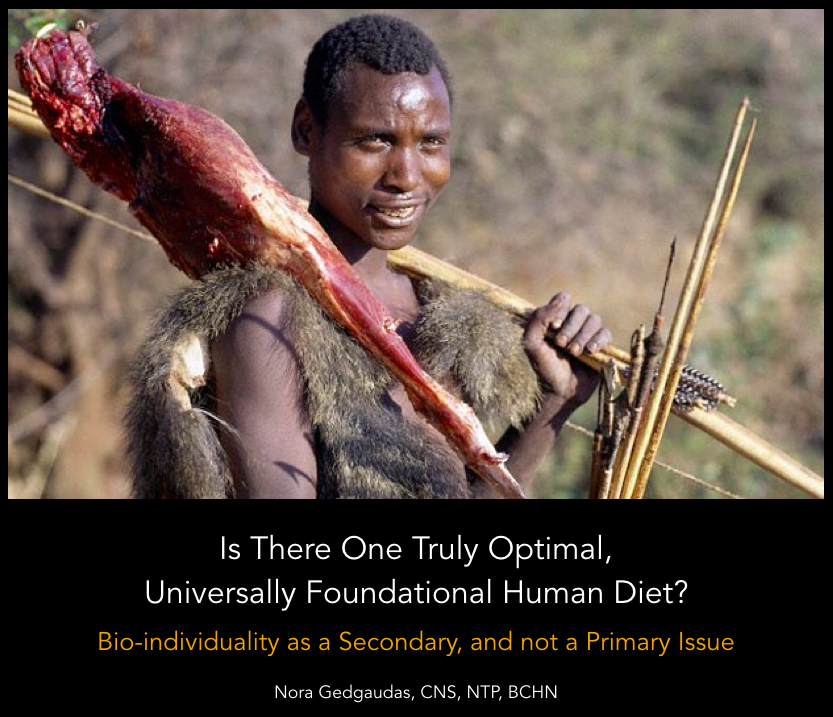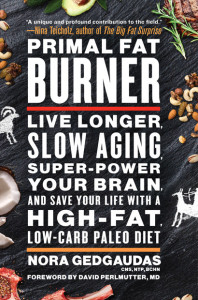 Too many of us I think have bought into the idea that “everybody is different” (as though this were stating some deep, rational and solemn wisdom)—therefore where being a vegetarian works for me it might not work for you—or where being a sugar burner is better for me being a fat burner works better for you… Yes, we are technically omnivores, and some of us get away with certain things better than others. But by no means does this imply that ALL foods we are capable of consuming are all equally optimal for us–or that we somehow need to consume a little of everything to be optimally healthy. Variety in some respects is good (our microbiome certainly likes variety—especially when it comes to fibrous vegetables and greens), but that by no means implies anything and everything goes with respect to our likes and preferences if we want to be optimally healthy in a world today where health compromises are hitting us from all sides and easily exceed health promoting influences.
Too many of us I think have bought into the idea that “everybody is different” (as though this were stating some deep, rational and solemn wisdom)—therefore where being a vegetarian works for me it might not work for you—or where being a sugar burner is better for me being a fat burner works better for you… Yes, we are technically omnivores, and some of us get away with certain things better than others. But by no means does this imply that ALL foods we are capable of consuming are all equally optimal for us–or that we somehow need to consume a little of everything to be optimally healthy. Variety in some respects is good (our microbiome certainly likes variety—especially when it comes to fibrous vegetables and greens), but that by no means implies anything and everything goes with respect to our likes and preferences if we want to be optimally healthy in a world today where health compromises are hitting us from all sides and easily exceed health promoting influences.
We seem to rationalize every indulgence with the other pseudo–wise mantra, “everything in moderation.” Why everyone silently nods their heads in reverent agreement every time they hear this phrase as though some great wisdom is being spoken is beyond me. REALLY? That’s not wisdom, that’s politics and/or wishful thinking! How much of anything metabolically dysregulating or inflammatory or disruptive to your endocrine and immune system or even potentially autoimmune provoking do you really want to enjoy “in moderation”? Are you really that completely healthy and symptom-free? And if you’re lucky (or young) enough to say yes—do you really think it’s always going to be that way? It is an almost unavoidable fact that we will all choose moments of some compromise in life, but these moments need to be chosen carefully and consciously, and compensated for as much as possible. And some compromises– especially in light of the dangerous autoimmune epidemic— should never, ever be made at all…by anyone. Case in point: gluten.
And yes—it IS possible to enjoy what you eat while also do the right things. Eating for joy does not need to mean “a little bit of everything goes.”
So getting to the first important point that needs to be made here….There isn’t a separate anatomy and physiology book written for everyone in this room. There are fundamental principles of anatomy and physiology that apply to each and every one of us as human beings. From there, we extrapolate from nuances and polymorphisms…but those nuances do not necessarily change the solidly established foundations we all share in common.
We each have unique fingerprints, but everyone has fingers.
As human beings we are all much more alike than we are unalike. We are all the same species (we are even all the same race for God’s sake–the HUMAN race, and we need to start acting like it) and we are ALL bound by the same fundamental anatomical and physiological laws. There isn’t a lot of wiggle room here. We all share a hydrochloric acid-based digestive tract that’s designed to make optimal use of animal source foods—-including animal fats—and not a fermentative-based digestive tract designed to make optimal use of plant foods (we can eat them, and benefit from them as omnivores, but they cannot supply any of us with everything we need to be optimally healthy on their own). There isn’t a different digestive design between any one person and another. We all physiologically have the same complement of digestive juices (namely HCl and pepsin) and digestive pancreatic enzymes. We all are SUPPOSED to have gallbladders to help us digest fats and fat-soluble nutrients. We all have the same basic skeletal structure, tissues, hormones, glands and neurotransmitters. We all share the same kinds of organs, the same type of unique brain (although some clearly work better than others). And unless something important has been amputated, we all share the same complement of appendages that work in roughly the same way (some of which are admittedly gender-specific). We all have a blood pH that ranges very narrowly between 7.35 and 7.45…or else. We all have and rely upon minute intracellular fat-burning factories known as mitochondria that make up close to 10% of our total body weight they are so numerous in us. Our cells all make energy—a-la something called the Krebs cycle, breaking down fat and/or glucose for generating the ATP that fuels our human machinery.
We all require the same ranges of macronutrients. We all need complete source protein. We all need a significant amount and variety of quality dietary fats, critical (animal source) fat-soluble nutrients and certain essential fatty acids that simply cannot be gotten from plant-based foods in order for us to be optimally healthy. And I am not saying we should not eat plants. Not at all. Far from it. But the fact is that there is no human alive for whom carbohydrates are dietarily foundationally essential, therefore there can be no such thing as a sugar or starch deficiency in anyone. There is no denying that. There are those that like to debate this. Within the actual science of human physiology there really is no debate.
All the same foundations are foundational for all of us in an extremely basic way. The rest is all nuance…
A few takeaways from my AHS16 talk:
1) The most important key to optimal health and to what makes us human in the first place lies not in our individual differences, but in that which we all have in common.
2) “Biochemical individuality” supplies the nuance, but it is our common physiological design that supplies our most essential foundations, which ALL humans share.
You can watch my full length talk for FREE here: https://youtu.be/8k5QixWL0fU
(If you like it, please comment on Youtube, thank you!)
To Your Health and Self-Empowerment,
~ Nora




So true Nora…
This mantra is actually a trick well exploited by food industry to keep people doing the same thing they have been doing, i.e. eating their junk.
The fact that one may tolerate carbs or fat better than another person is far from being an excuse to eat junk.
This is a really stupid nonsense hard to die
Yes and no. The human genome amongst animals is incredibly stable, likely as we use culture as rapid adaptation over animals that use more genetic selection based adaptation. That said, there are clear regional adaptations to regional bioavailability. For example, Nordic dwellers can show up to four times the alleles for fat metabolism where as Andeans show similarly for starch metabolism. I think there is without question universal basics for our species, however I think dietary globalism is actually harming human health. I think ancestral regionalism will become more apparent as nutrigenomics develop. It stands to offer some insights into our origins that can help link us to our past while optimizing the present.
The fact that there are certain occasionally genetic adaptations that allow for the digestion of certain regionally available foods (and I’m speaking specifically of starchy tubers and amylase gene expression, lactose from milk, etc.) does not in any way suggest that those adaptations mean that those foods are necessarily optimizing (or even required in any way) for the health of those consuming them. In other words, just because I may have a few more pairs of amylase genes than you doesn’t mean that dietary utilizable carbohydrates (sugar/starch) are in any manner, shape or form “essential” to me, much less optimizing for my health. It also doesn’t imply that these foods are in any way necessary, only that they are perhaps slightly better tolerated. The long-term consequences of chronic high carbohydrate consumption and insulin dependence are ultimately the same for all of us: it is always impairing in some way of health and longevity. Longevity research over the last century when it comes to everything from yeast to primates is abundantly clear on this.
Ancestral regionalism is rapidly becoming a thing of the past. It is increasingly difficult to find persons that come from any single ethnic group genetic line to the exclusion of others. Even so, there isn’t a separate book of anatomy or physiology for everyone expressing a pure ethnic or regional variation.
I think my book, Primal Fat Burner does a good, fairly succinct job of making the case for what I propose as a more universal foundational approach to eating and is quite well referenced.
And I agree that globalism is a scourge upon not just humanity, but upon all life on earth. And agriculture— particularly monoculture agriculture— is at the heart of the problem and agenda on multiple levels. The cultural and dietary changes we have undergone since our departure from leading hunter gatherer lifestyles has not demonstrably resulted in evolutionary advances, but instead has served to do little more than lead us to a compromised genome. Add official government guidelines to the mix to pound the last nail into the coffin…
~Nora Gedgaudas, CNS, NTP, BCHN